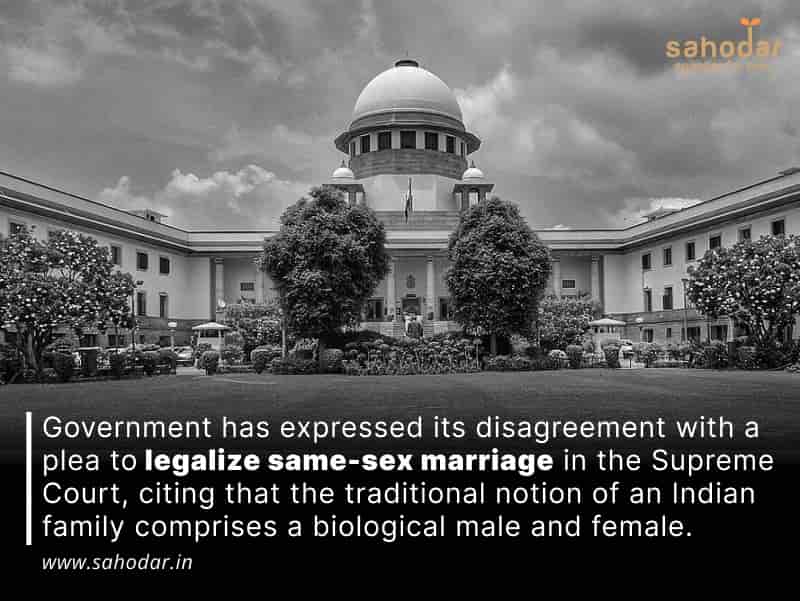The Indian government has opposed the plea for legalizing same-sex marriage, stating that it is not a fundamental right. In an affidavit filed before the Supreme Court, the government argued that the traditional Indian family unit involves a biological man as a husband, a biological woman as a wife, and children born out of their union, and that this concept cannot be compared to same-sex relationships.
The government further argued that recognizing and registering same-gender marriages is not sufficient to address family issues, as the Indian family unit concept extends beyond it. The affidavit emphasized that the family unit presupposes a biological man as the husband, a biological woman as the wife, and children born out of their union, and that living together and engaging in a sexual relationship as same-sex partners is not equivalent to it, even though same-sex relationships have been decriminalized.
In response to petitions seeking the extension of the right to same-sex marriage to LGBTQIA+ citizens, the Indian government filed an affidavit before the Supreme Court. The affidavit stated that while citizens have the right to association under Article 19 of the Constitution, the State is not obliged to grant legal recognition to such associations. The government argued that Article 21’s right to life and liberty does not imply endorsement of same-sex marriage.
The bench, comprising Chief Justice of India DY Chandrachud and Justices PS Narasimha and JB Pardiwala, had earlier transferred all petitions seeking recognition of same-sex marriage from various High Courts to itself.
The government contended in the affidavit that allowing same-sex marriage would contravene existing personal and codified laws, including those pertaining to prohibited relationships, marriage conditions, and ceremonial and ritual requirements under personal laws governing individuals. It further argued that the legislative intent was limited to the recognition of a legal relationship of marriage between a man and a woman as husband and wife, and that the petitioners’ requests in PIL/Writ jurisdiction would amount to changing the legislative text and intent under various codified statutes related to marriage and related issues.
The Central government cited the Domestic Violence Act to support its argument that implementing existing statutory provisions related to prohibited relationships, ceremonial and ritual requirements, and marriage conditions in the context of same-sex marriage is not feasible. The government maintained that the legislative intent was only to recognize legal marriage and benefits for heterosexual couples, and that the Court cannot override this intent. The government clarified that although same-sex relationships are not illegal, the State only recognizes heterosexual relationships for marriage purposes. The affidavit also stated that the State does not recognize other forms of personal relationships between individuals, but they are not unlawful.
Supriyo Chakraborty and Abhay Dang, who have been in a committed relationship for almost a decade, filed a petition seeking recognition of same-sex marriage. Although they held a wedding-cum-commitment ceremony to celebrate their ninth anniversary, their relationship is not legally recognized. The couple’s petition cited the Puttaswamy case, in which the Supreme Court affirmed that LGBTQIA+ persons have the same rights to equality, dignity, and privacy as all other citizens under the Constitution.
Another petition, filed by gay couple Parth Phiroze Mehrotra and Uday Raj, argued that the non-recognition of same-sex marriages violates the right to equality under Article 14 and the right to life under Article 21 of the Constitution.
Source: https://www.barandbench.com/news/litigation/central-government-opposes-same-sex-marriage-plea-supreme-court

